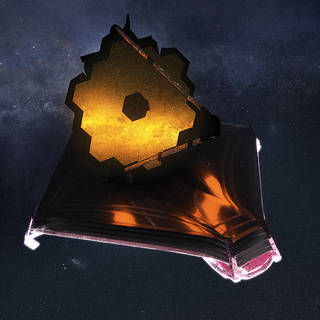
Copernical Team
Canadian student rocketry group reaches new heights with Spaceport Nova Scotia's first launch
 Recently, a group of some of the brightest young minds in the fields of Canadian science, technology, engineering and mathematics (STEM) took their passion for rocketry and space to new levels as they launched their amateur high-powered rocket from Spaceport Nova Scotia.
Arbalest Rocketry, a rocketry team from Ontario's York University, made the most of a Launch Canada initiated opportunit
Recently, a group of some of the brightest young minds in the fields of Canadian science, technology, engineering and mathematics (STEM) took their passion for rocketry and space to new levels as they launched their amateur high-powered rocket from Spaceport Nova Scotia.
Arbalest Rocketry, a rocketry team from Ontario's York University, made the most of a Launch Canada initiated opportunit After the launch of Euclid: 'This is a big step toward understanding dark matter and dark energy'

What is it like to work on the fundamental questions about the universe? On July 1, the Euclid satellite launched successfully. This mission from the European Space Agency will take images of the sky to create the most detailed map of the universe ever made. Astronomer Henk Hoekstra (Leiden Observatory) and physicist Alessandra Silvestri (Leiden Institute of Physics) tell about their role in the mission.
The new space satellite is like the Google of the universe. "Euclid is basically a data-gathering machine," Hoekstra explains. "What Hubble covered in 30 years, Euclid can do in one week in both optical and infrared wavelengths. So it's a huge volume of data. With this, you are guaranteed to find the needle in a haystack."
Hoekstra has multiple roles in the mission. He is the lead of the weak lensing group and one of the four cosmology coordinators. This means he was involved from the early stages to set the requirements for the accuracy of the data Euclid will obtain.
Join NASA to Celebrate Webb Space Telescope’s First Year of Science
 NASA is commemorating the first year of science and discoveries from the agency’s James Webb Space Telescope, the largest, most powerful, and most complex space telescope ever built. To celebrate the anniversary, multiple events will take place online and live across the U.S.
NASA is commemorating the first year of science and discoveries from the agency’s James Webb Space Telescope, the largest, most powerful, and most complex space telescope ever built. To celebrate the anniversary, multiple events will take place online and live across the U.S. Seven European IoT providers choose EchoStar for real-time satellite connectivity
 EchoStar Corporation (Nasdaq: SATS) reports that seven leading European Internet of Things (IoT) service providers have signed multi-year commercial agreements to develop and sell IoT solutions using EchoStar Mobile's Pan-European, satellite based, LoRa-enabled IoT network.
The customers, API-K, Cyric, DalesLandNet, Dryad, Galaxy1, ProEsys and Symes are leveraging the real-time network to
EchoStar Corporation (Nasdaq: SATS) reports that seven leading European Internet of Things (IoT) service providers have signed multi-year commercial agreements to develop and sell IoT solutions using EchoStar Mobile's Pan-European, satellite based, LoRa-enabled IoT network.
The customers, API-K, Cyric, DalesLandNet, Dryad, Galaxy1, ProEsys and Symes are leveraging the real-time network to PIGS finds ancient stars in the heart of the Milky Way
 An international team of researchers has obtained the largest set of detailed observations yet of the oldest stars in the centre of our Galaxy, the Milky Way. The Pristine Inner Galaxy Survey (PIGS) team finds that this group of stars is slowly spinning around the centre of the Milky Way, despite being thought to have formed in a chaotic fashion.
They also seem to spend most of their long
An international team of researchers has obtained the largest set of detailed observations yet of the oldest stars in the centre of our Galaxy, the Milky Way. The Pristine Inner Galaxy Survey (PIGS) team finds that this group of stars is slowly spinning around the centre of the Milky Way, despite being thought to have formed in a chaotic fashion.
They also seem to spend most of their long 'Sandwich' discovery offers new explanation for planet formation
 Scientists have made a new discovery on how small planets might form.
Researchers at the University of Warwick investigated the "birth environment" of planets - areas of gas and dust that swirl around a central star - known as the protoplanetary disc.
They discovered a new method of planet formation in this region, not yet described in previous research. The work has been submitted t
Scientists have made a new discovery on how small planets might form.
Researchers at the University of Warwick investigated the "birth environment" of planets - areas of gas and dust that swirl around a central star - known as the protoplanetary disc.
They discovered a new method of planet formation in this region, not yet described in previous research. The work has been submitted t Superconducting qubit foundry accelerates progress in quantum research
 In the past three decades, quantum computing has grown from a theoretical fantasy to a worldwide industry, pushing closer to a technology that could one day solve problems too complex for even the most powerful supercomputers. MIT Lincoln Laboratory is not only at the forefront of research, but is making quantum research accessible to a broader community through its Superconducting Qubits at Lin
In the past three decades, quantum computing has grown from a theoretical fantasy to a worldwide industry, pushing closer to a technology that could one day solve problems too complex for even the most powerful supercomputers. MIT Lincoln Laboratory is not only at the forefront of research, but is making quantum research accessible to a broader community through its Superconducting Qubits at Lin Highly oxidizing magma of the early Earth
 Elucidating the atmosphere and surface environment of the early Earth, especially before the origin of life, is a key to understanding the habitability of the Earth. The atmosphere of terrestrial planets has been thought to be formed by degassing volatiles from the interior and its composition is mainly controlled by the oxidation state of the mantle. To understand the mantle oxidation state, th
Elucidating the atmosphere and surface environment of the early Earth, especially before the origin of life, is a key to understanding the habitability of the Earth. The atmosphere of terrestrial planets has been thought to be formed by degassing volatiles from the interior and its composition is mainly controlled by the oxidation state of the mantle. To understand the mantle oxidation state, th Satellogic and OHB to collaborate on environmental earth observation applications
 Satellogic Inc. announced this week that it will collaborate with OHB SE, a German-based aerospace and technology group on the development of advanced Earth Observation data-based services focused on environmental sustainability.
The organizations will explore applications where EO data and products can further support decision-making in agriculture, forestry, energy, critical infrastructu
Satellogic Inc. announced this week that it will collaborate with OHB SE, a German-based aerospace and technology group on the development of advanced Earth Observation data-based services focused on environmental sustainability.
The organizations will explore applications where EO data and products can further support decision-making in agriculture, forestry, energy, critical infrastructu Earth formed from dry, rocky building blocks
 Billions of years ago, in the giant disk of dust, gas, and rocky material that orbited our young sun, larger and larger bodies coalesced to eventually give rise to the planets, moons, and asteroids we see today. Scientists are still trying to understand the processes by which planets, including our home planet, were formed. One way researchers can study how Earth formed is to examine the magmas
Billions of years ago, in the giant disk of dust, gas, and rocky material that orbited our young sun, larger and larger bodies coalesced to eventually give rise to the planets, moons, and asteroids we see today. Scientists are still trying to understand the processes by which planets, including our home planet, were formed. One way researchers can study how Earth formed is to examine the magmas 
